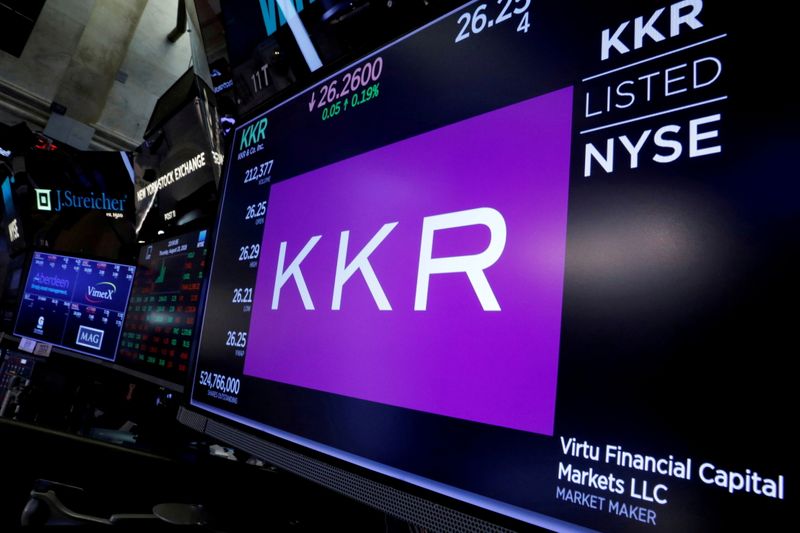By Chibuike Oguh and Jessica DiNapoli
(Reuters) - Changes in the share structure of KKR & Co (NYSE:KKR) Inc, Apollo Global Management (NYSE:APO) Inc and Carlyle Group (NASDAQ:CG) Inc that strip the private equity firms' founders of voting control are making them and their employees wealthier, according to a Reuters review of regulatory filings.
Founders and executives at KKR, Apollo and Carlyle were awarded payouts worth $560 million, $584 million and $346 million, respectively, as part of relinquishing special voting shares, the filings show.
KKR said on Monday it would eliminate the dual-class share structure that gives its executives -- including founders Henry Kravis and George Roberts -- voting control, in order "to align the interests" of its leadership with shareholders.
The new "one share, one vote" regime would make the executives' voting rights proportional to the shares they own, representing collectively a 31.7% stake in KKR.
Yet as part of a complex web of mergers of corporate entities to do away with the dual-class share structure by 2026, KKR will give its executives 8.5 million newly issued shares currently worth about $560 million, according to regulatory filings.
KKR is obligated to make the payout under a tax receivable agreement (TRA) inked with its founders more than a decade ago, the filings show. The agreement, adopted separately by all major private equity firms when they went public, forces KKR to pay out 85% of the value of the tax benefits it has amassed through good will, amortization, depreciation and related tax credits to its executives.
The exchange of KKR executives' special voting shares for common stock triggers the payout under the TRA, the New York-based firm said in one filing.
It would be the last payout to KKR executives made under the TRA, which will be abolished as part of the reorganization, the filing states. The $560 million payout is equivalent to a 1% drop in KKR's first-half after-tax distributable earnings per adjusted share and represents a 4% decline in its book value per adjusted share as of June 30, according to one filing.
Private equity firms have often turned to TRAs because, as part of their deal-making, they often dabble in initial public offerings, which allow the private equity firms to pass on to themselves the value of tax benefits of companies they own that are taken public.
The private equity firms stand apart from how most companies end dual-class stock arrangements. Meal delivery provider Blue Apron Holdings (NYSE:APRN) Inc, for example, converted into one class of common stock last month without any windfall for its executives. Asset manager Victory Capital Holdings (NASDAQ:VCTR) Inc similarly eliminated its dual-class structure last month.
Robert Willens, a tax expert and professor of finance at Columbia Business School, said KKR executives had the discretion to forfeit the payout owed under the TRA.
Even so, he said that some KKR investors may be happy because the executives did not exercise their right to ask for future payments they stood to receive from KKR under the TRA before agreeing to abolish it.
"(The KKR executives) did undoubtedly leave some money on the table," Willens said.
A KKR spokeswoman pointed to a filing showing that a committee of KKR's independent board directors unanimously approved the transactions for dissolving the dual-class share structure, which was done to "increase the rights of our common stockholders" and "enhance corporate governance at KKR." She declined to comment further.
APOLLO, CARLYLE
Apollo's founders and executives secured a payout of at least $584 million over four years in similar fashion under its TRA when the firm announced in March it would eliminate its dual-class structure, regulatory filings show. The executives elected to receive the payout in cash rather than Apollo stock.
A source familiar with the matter said the payout was worth only half the value of the accrued tax benefits owed to the founders, who agreed to forego the other half in the interest of Apollo's shareholders.
Carlyle was the first among the major publicly listed private equity firms to get rid of special voting rights for its executives in 2019. The change triggered a $346 million cash payout over five years for the Carlyle executives under its TRA, filings show.
A Carlyle spokeswoman declined to comment.
The use of TRAs by private equity firms attracted U.S. lawmaker scrutiny in 2007, when Blackstone Group (NYSE:BX) Inc disclosed in its initial public offering that its executives could receive tax benefits totaling $863.7 million over the next 15 years under the arrangement.
However, Congress never passed into law proposed legislation that would have taxed TRA payments as ordinary income. The use of TRAs expanded in popularity, and some private equity firms used them to extract value from portfolio companies they take public.
Blackstone has kept its dual-class share structure, leaving CEO Stephen Schwarzman in control.
